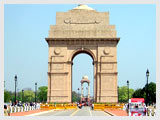
Markha Valley via Ganda Exploring Flamboyant India
Region: Ladakh
Season: July to Mid-September

Trekking along the Markha River through "Little Tibet," one of the world's highest inhabited plateaus, you take in spectacular views of the Great Himalayan, Ladakh & Zanskar ranges. You will cross two high passes at elevations up to 17,400'. Trails wind past willow groves, alongside patches of wild roses & through pastel canyons festooned with multi-hued prayer flags undulating in the breeze. The opportunity to meet nomadic families as they herd their yaks & a visit to a small monastery where butter lamps are lit morning & evening by an elderly nun leave indelible impressions of our journey through this gloriously illuminated landscape.
After the initial period of acclimatization to high altitude in Leh you will set out to explore the heartland of the central Ladakh Valley. It involves crossing of the three passes - Stok La- 4848m, Kagmaru La- 5274m, Gandla- 4878m & walking on the banks of the Markha River. The highlight of the trip is the camping at the base of the Kang-Yutze peak on the plains of Nimaling.
Duration: 12 Nights & 13 Days
Routing: Delhi - Leh - Stok La - Rumbak - Skiu - Markha - Hankar - Nyimaling - Chugdo - Hemis - Thiksey - Leh - Delhi
| Tour Highlights | |
| Leh | Leh Palace, Leh Market, Leh Gompa,Shanti Stupa |
| Nyimaling | Glacier of Kangyatse |
| Hemis | Monasteries |
| Delhi | Red Fort,Raj Ghat, India Gate, President House, Humayun Tomb & Qutub Minar Optional Sound & Light Show at Red Fort & dinner at Chor Bizarre |
Detailed Itinerary
Day 01: Arrive Delhi
Arrive by International flight, after traditional 'Swagat' (Welcome) our representative would assist you at airport & transfer to hotel for check in.
Delhiisa bustling metropolis, which successfully combines in its folds the ancient with modern. Its strategic location was the prime reasons why successive dynasties chose it as their seat of power. In fact, more mythological cities are believed to be here, like the city of Indraprastha from the Hindu epic Mahabharata, founded around 5000 BC. Numerous monuments were built over several centuries by different rulers like Qutub-ud-din Aibek, Alauddin Khilji, Tughlaks, Humayun & Shah Jahan, who built the Walled City Shah Jehanabad.
Later in first half of 20th century much of New Delhi was planned by Sir Edwin Lutyens, who laid out a grandiose central administrative area as a testament to British rule in India. The division in walled city & New Delhi also marks the division in life styles.
Overnight Hotel - Delhi (B)
Day 02: Delhi - Leh (By Flight)

Early morning transfer to the Domestic Airport to board the flight for Leh. Upon arrival at Leh Airport our representative would assist you at the Airport & transfer to the Hotel for check-in. Rest of the day at leisure & acclimatization. Later in the afternoon a walk around Leh town (3521 m) & visit Leh Market, Leh Palace ruins, Leh Gompa & Shanti Stupa. This walk shall help in getting acclimatized at this height.
Overnight Hotel - Leh((B, L, D)
Day 03: Leh - Shey - Stok - Base of Stok La (25 km drive -4 hr trek)
Today we drive 16 km from Leh & visit Shey, the ancient capital of Ladakh. The monastery here has a huge gold-gilded statue of Buddha Shakyamuniwith a large silver lamp burning in front of the statue.
After that we drive few kilometres & cross the bridge over the mighty River Indus to reach Stok. We visit Stok Palace,the Royal residence of the King of Stok & the Museumthat has a rich collection of ancient Ladakhi artefacts including old Thangkas, precious stones, arms & armoury, the Queen’s necklace & the crown of the King of Ladakh among others. After early lunch at Stok we start trekking towards theBase of Stok La.It is a gradual walk with a few kilometres of ascending path, which will be covered in about 4 hr.
Overnight Camp - Stok (B, L, D)
Day 04: Base of Stok La - Stok La (4800 m)
Stok La - Rumbak (12 km trek -6 hr)
Today we trek to Rumbak over Stok La (4800 m). The 3 km trek upto Stok La is steep ascent & then it is a steep descent upto Rumbak. The total distance of 12 kms will be covered in about 6 hr. Rumbak is a small shepherd village with few houses.
Overnight Camp - Rumbak (B, L, D)
Day 05: Rumbak - Gand La (4930 m)
Gand La - Skiu (3380 m) (18 km trek -8 hr)
Today is a long day & after early breakfast we trek towards Skiu over Gand La (4930 m). It is a climb upto Gand La top & then a descending path upto Shingo & from there we reach Skiu (3380 m). A distance of 18 km will be covered in about 8 hr.
Overnight Camp - Skiu(B, L, D)
Day 06: Skiu - Markha(4500 m) (16 km trek -6 hr)
Today we trek to Markha via Hermoger & Sase. An easy walk of about 15 km will be covered in about 6 hr. Markha (4500 m) is the main village at the height of about 4500 m & it also has a school.
Overnight Camp - Markha (B, L, D)
Day 07: Markha - Hankar (12 km trek -6 hr)
Today we trek upto Hankar via Omlung. A distance of about 12 km of gradual walk will be covered in about 6 hr.
Overnight Camp - Hankar (B, L, D)
Day 08: Hankar - Nyimaling (12 km trek -6 hr)
Today we trek to Nyimaling, a gradual walk of about 12 km will be covered in about 6 hr.

Overnight Camp - Nyimaling (B, L, D)
Day 09: Nyimaling (Rest Day)
Today the day is free to explore the surroundings. One can trek upto the glacier of Kangyatse peak (6030 m), one needs permit from (Indian Mountaineering Foundation, IMF) to climb this peak.
Overnight Camp - Nyimaling(B, L, D)
Day 10: Nyimaling - Kongmor La (5200 m) - Chugdo
Today we start our steep ascent of 4 to 5 km to Kongmor La (5200 m). On reaching the top one forgets the tiredness of the steep climb after viewing the beautiful range of Mountain peaks & feels refreshed. From the Pass we descend all the way to Chugdo.
Overnight Camp - Chugdo (B, L, D)
Day 11: Chugdo - Hemis - Thiksey - Leh (13 km trek -6 hr)
Today we trek down to Hemis via Oza & Sumdo. A gradual walk of about 13 kms will be covered in about 6 hr.
We visit the famous Hemis Monastery, founded in the year 1630 by Stag-tsang-ras-pa under the royal patronage of Sengge Namgyal. Hemis is one of the largest & richest monasteries of Ladakh. The two-day festival of monastic dance in July -August has raised the reputation of Hemis particularly high. The festival is dedicated to Guru Padmasambhava, popularly known as second Buddha & responsible for spreading Buddhism in the Tibetan world.
From here we drive to Thiksey Monastery, which falls on the way to Leh. Thiksey Monastery(Gompa) is an impressive complex rising tier upon tier on a hill above the village. The monastery has a beautiful 30 m high gold-plated statue of Maitreya Buddha,the Buddha of the future. Finally we drive back to Leh.
Overnight Hotel - Leh (B, L, D)
Day 12: Leh Monasteries
Today at leisure till lunch. Later in the afternoon we go on half day tour of the monasteries around Leh & visit Shankar, Spituk& Phyang monasteries.
Overnight Hotel - Leh (B, L, D)
Day 13: Leh - Delhi (Flight 9W-610 -0840 hr - 0955 hr) - Departure
Today you will transfer to the Airport to board the flight to Delhi.
Today we take a guided tour of Old Delhi, the 17th century walled city of Shah Jehanabad, Visiting the great Jama Masjid, the principal mosque of Old Delhi. Built in the year 1656 AD by the Mughal Emperor Shah Jahan, it is the largest & best known mosque in India. Later we walk down or take a rickshaw ride through Chandi Chowk, the old marketplace of Shah Jehanabad now a picturesque bazaar to reach Red Fort, built in the year 1648 by Shah Jehan.

In New Delhi, we visit Raj Ghat, memorial to the Father of the Nation, Mahatma Gandhi. It is a simple black marble platform that marks the spot of his cremation on 31 January 1948. Further we drive past India Gate, memorial built in the year 1931 to commemorate the Indian soldiers who died in the World War I & the Afghan Wars. The names of the soldiers who died in these wars are inscribed on the walls. President's House, the official residence of the President of India, built in the year 1931. Until 1950 it was known as Viceroy's House & served as the residence of the Governor-General of British India. We will also visit Humayun's Tomb, memorial of Mughal Emperor Humayun, built in the year 1562. The complex is a World Heritage Site & the first example of this type of Mughal architecture in India. Qutub Minar, built in the year 1206 by Qutub-ud-din Aibek. It is the tallest (72m) brick minaret in the world, an important example of Indo-Islamic Architecture. Qutub Minar & its monuments are listed as a UNESCO World Heritage Site.
Later dinner transfer to International airport.
Our tour concludes: We thank you for your patronage & look forward serve you again in near future.
Package includes
- 12 Nights accommodation on twin sharing basis with Breakfast.
- All from Leh to Leh
- Monastery entry fee
- Transportation as per the itinerary (No transportation on leisure days).
- Local English speaking guide for the Tour
- Services of Helper, Porter, Cook during trekking
Package does not include
- Any airfare or airport tax.
- All presently applicable taxes.
- Any insurance or claim due to natural calamities such as land slide, road blockage etc.
- Any expense of personal nature such as hard/soft drinks, laundry, phone/fax calls, tips etc.
- Any other expense not mentioned in the “Package includes”.
TOUR FREE QUOTES
Trains Destinations
- Agra
- Aihole
- Ahmedabad
- Ajanta
- Alwar
- Aurangabad
- Bandipur
- Bangalore
- Balasinor
- Bharatpur
- Bikaner
- Bedami
- Belur
- Bhavnagar
- Bijapur
- Chittorgarh
- Chittorgarh
- Delhi
- Dilwara
- Ellora
- Fatehpur Sikri
- Gadag
- Ganapatipule
- Goa
- Gwalior
- Halibid
- Hampi
- Hassan
- Hyderabad
- Jaigadh
- Jaipur
- Jaisalmer
- Jodhpur
- Junagarh
- Kolhapur
- Khajuraho
- Kumarakom
- Kutch
- Lucknow
- Mahabalipuram
- Mehsana
- Modhera
- Mumbai
- Mysore
- Nagzira
- Nasik
- Orchha
- Palitana
- Pattadakal
- Pune
- Ranakpur
- Ratnagiri
- Ranthambore
- Sariska
- Sanchi
- Sarkhej Roza
- Sasan Gir
- Sawantwadi
- Shirdi
- Sindhudurg
- Thanjavur & Chettinad
- Tarkarli
- Tadoba
- Udaipur
- Vadodara
- Varanasi
- Veraval
- Sawai Madhopur
- Kabini - Bandipur




 +91 971 730 0203
+91 971 730 0203
 Recognized by Ministry of Tourism, Government of India National Tourism Award Winner
Recognized by Ministry of Tourism, Government of India National Tourism Award Winner